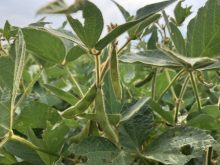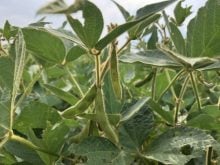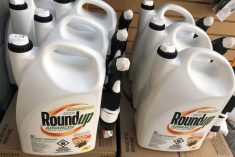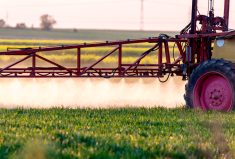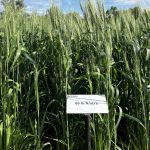Updated, June 25 — Farmers in Canada, the U.S. and elsewhere shouldn’t expect any changes to availability or label directions for Bayer’s stable of glyphosate and dicamba herbicides, coming out of a massive settlement for thousands of lawsuits, the company says.
The German company announced Wednesday it expects to spend up to $12 billion in the next few years to resolve “major legacy Monsanto litigation” — a reference to the U.S.-based chemical and seed company it bought for $63 billion in 2018 (all figures US$).
Read Also
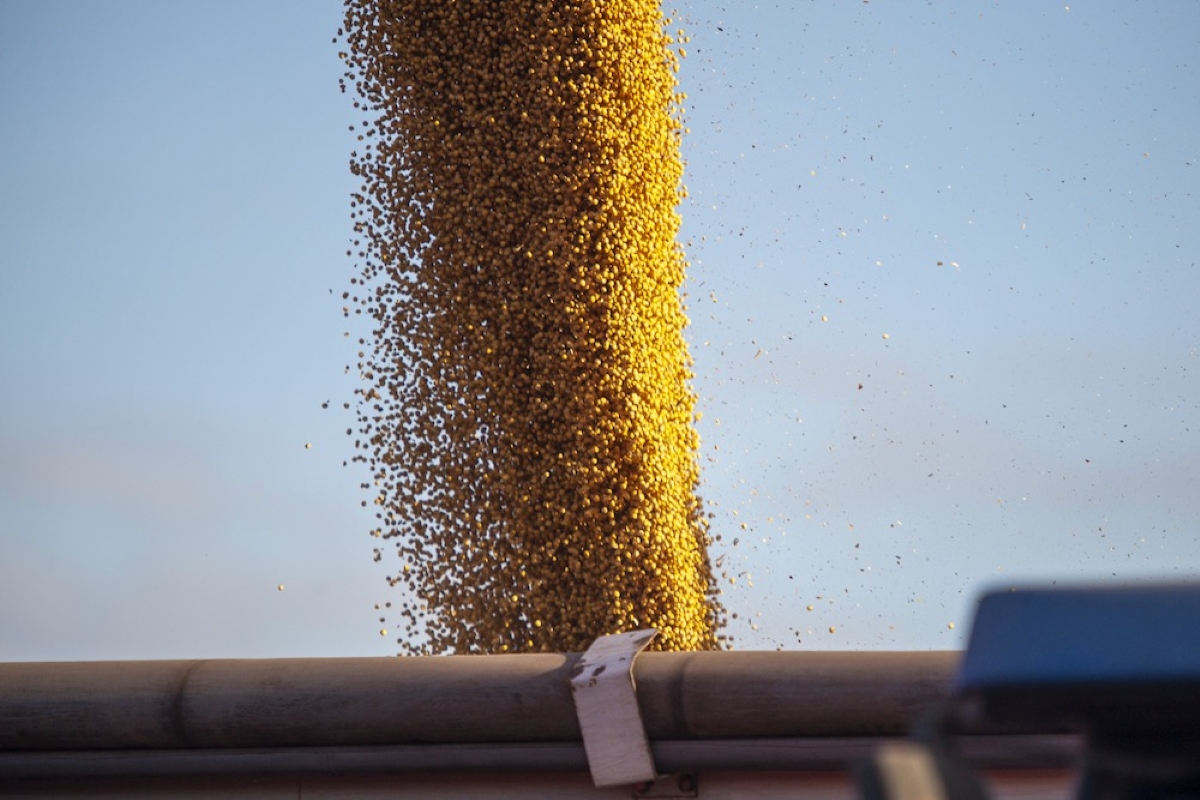
Brazil to reap record soy crop in 2025/2026, increase exports
Brazil’s Conab said the country will reap a record soybean crop of 177.6 million tons in the 2025/2026 harvest year, according to data released on Thursday.
Glyphosate
Of that $12 billion, between $10.1 billion and $10.9 billion will go to “resolve current and address potential future Roundup litigation” — referring to about 125,000 “filed and unfiled” lawsuits alleging that the glyphosate-based product caused plaintiffs’ cases of non-Hodgkin’s lymphoma (NHL).
The deal announced Wednesday will settle the “vast majority” of current glyphosate-related suits, including 75 per cent of current cases and 95 per cent of cases set for trial, Bill Dodero, Bayer’s assistant general counsel and global head of litigation, told farm journalists on a conference call Wednesday.
The balance of the funds announced Wednesday are expected to allow for closure of any other related cases “in due course,” he said, noting the company is in negotiations with other lawyers about their “inventories” of such cases.
Class-action mechanisms will also limit future claims yet to be made, he added.
In a separate online notice to Canadian producers Wednesday, Bayer CropScience’s Canadian arm said the settlements “apply only to U.S. litigation” and “have no bearing on litigation in Canada.”
Furthermore, Bayer said in that notice, the company is “not contemplating a settlement of the Canadian cases related to glyphosate.”
While the U.S. and Canadian legal systems have “some similarities,” Bayer said, the two “are in fact quite different, including with respect to damage awards” and “very different considerations apply in Canada.”
At least one Canadian lawyer seeking certification for a class action, with a Saskatchewan farmer as the representative plaintiff and “slightly over 500” interested claimants, also confirmed Bayer’s statement.
Regina layer Tony Merchant told the Western Producer on Wednesday the announced settlements don’t apply to potential actions in Canada.
Bayer also plans to continue its appeals of glyphosate-related U.S. court decisions already made, Dodero said, as those include important arguments which could “reduce or perhaps even eliminate future litigation.”
Those decisions include the Dewayne Johnson, Edwin Hardeman and Alva and Alberta Pilliod cases in California.
In all, Dodero said, the settlements and appeals will provide Bayer with “the closure we require.”
Bayer “is in a position to still defend, and that’s very important, the science behind the product,” Dodero said, and the settlement “keeps our important legal arguments related to pre-emption and causation open” while putting the products’ assessments back in the hands of “regulators and experts.”
A class agreement governing “potential future cases” related to glyphosate includes the creation of an independent “class science panel,” which over the next four years will re-evaluate the chemical, Bayer said.
The panel, Bayer said, “will determine whether Roundup can cause (NHL), and if so, at what minimum exposure levels.”
If that panel finds “no causal connection” between the chemical and NHL, “class members will be barred from claiming otherwise in any future litigation against the company.”
Until the panel releases its findings, Bayer said, class members can’t proceed with Roundup claims or seek punitive damages.
The class agreement also commits Bayer to put $1.25 billion toward NHL research and diagnostic programs as well as “assistance payments to class members who develop NHL” before the panel makes its determination.
The Roundup class agreement, Bayer said, remains subject to approval by Judge Vince Chhabria of the U.S. District Court for the Northern District of California.
Dicamba
Up to $400 million will be set aside to resolve multi-district litigation related to non-targeted damage alleged to be caused by dicamba herbicides due to spray drift between 2015 and the current crop year.
Claimants seeking payouts from that settlement will have to provide proof of damage to crop yields and “evidence that it was due to dicamba” in order to collect, Bayer said.
Bayer also “expects a contribution from its co-defendant, BASF” toward settling those cases.
However, the only related dicamba drift case to have so far gone to trial — the Bader Farms case — is “not included in this resolution,” Bayer said.
The company believes the Bader case’s verdict is “inconsistent with the evidence and the law and will continue to pursue post-trial motions and an appeal, if necessary.”
Bayer said it “stands strongly behind the safety and utility” of its dicamba-based XtendiMax herbicide and “continues to enhance training and education efforts to help ensure growers use these products successfully.”
Asked whether the dicamba settlement might impact Bayer’s efforts to re-register dicamba in the U.S. — in the wake of a recent court case vacating its current federal registration there — Bayer CropScience president Liam Condon said the spray drift settlement is not connected.
Bayer now expects its dicamba re-registration to be approved this fall, based on “the latest data” available, which he said will be more current than the data on which the vacated registration was based.
PCBs
Also, about $820 million will go to resolve “most” of the company’s exposure to cases from U.S. state and local governments relating to wastewater discharges of polychlorinated biphenyls (PCBs), compounds formerly used mainly in coolants and insulators for electrical equipment.
Monsanto, according to Bayer, “legally manufactured PCBs” up until their manufacture and import were banned across North America in 1977, due to concerns over environmental impacts and risks of cancers and other illnesses in cases of long-term, high-level exposure.
In all, Bayer said Wednesday, cash payments are expected to begin this year, and the company assumes “potential cash outflow” will be no more than $5 billion in each of 2020 and 2021, with the rest to be paid out in 2022 or later.
To finance the payouts, Bayer said it may use current “surplus liquidity,” future free cash flows, bond issuances and/or the proceeds from the previously-announced $7.6 billion sale of its Bayer Animal Health division to Elanco, which it now expects to complete in August.
“Greater certainty”
Bayer emphasized the agreements announced Wednesday “contain no admission of liability or wrongdoing.”
Lisa Safarian, regional head for Bayer CropScience’s North American division, said on Wednesday’s conference call the agreements will “bring greater certainty to our farmer customers about the availability of our products” going forward.
There will be “no change” in availability for the crop chemicals in question due to the agreements, she added.
Asked whether the settlements will lead directly to any changes to label directions for farmers’ use of Bayer’s glyphosate or dicamba products, Condon said the company does “not expect any changes whatsoever to the labels of the products.”
“Basically, every regulator in the world has approved glyphosate as safe and non-carcinogenic,” he said, and “multiple” regulators reaffirmed it as such after the World Health Organization’s International Agency for Research on Cancer (IARC) in 2015 classified glyphosate as “probably carcinogenic to humans.”
“If you kind of step back, what we’re doing here is, in essence, we’re paying an awful lot of money to take the discussion about the safety of glyphosate out of the courtroom and actually put it back in the scientific and regulatory arena, because that’s where it belongs,” Condon said on the call.
The U.S. Environmental Protection Agency, Dodero added, had already written a letter to glyphosate manufacturers in which it “expressly said any label change indicating a cancer or carcinogenicity warning would be false and misleading.” — Glacier FarmMedia Network






